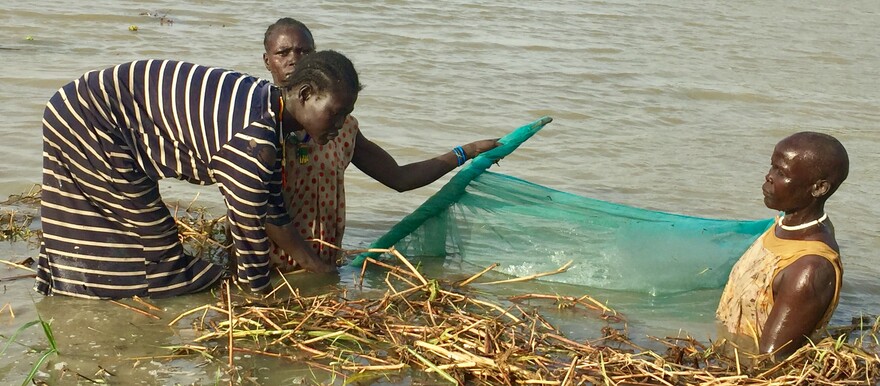Most families in Tonj South County of Warrap State are struggling and looking for another way of getting food; many have resorted to fishing to feed their children.
Speaking to Radio Tamazuj on Saturday, several women who have resorted to fishing to feed their families said last year’s flooding has resulted in poor harvest and that many families are struggling to get food.
Ajak Awuer, a woman who was fishing on the Wan-Alel River, said last year’s flooding has dramatically affected the harvest of crops, forcing them to depend on fishing.
“We are suffering because last year’s flood has affected us negatively, it has destroyed our crops. Now, we are very hungry, we are now depending on fishing,” she said.
Awuer called on the government and humanitarian agencies to intervene before their situation deteriorates further.
Another woman, Ajok Kamic, said: “What we get from here is what our children eat, if we stay at home then our children will have nothing to eat. So we are suffering so much, we need assistance so that our children can survive.”
For his part, Tonj County Commissioner Marko Agor Malang Agor said: “Actually, our people are suffering from hunger, especially women, children and the elderly because last year’s flood destroyed the crops.”
Agor said the county has experienced poor harvest, especially in Manyangok, Wan-Alel, Mabioryar and Malualmock areas.
“There is no food in those areas, people there have nothing to eat… you might have seen that women and children are fishing, so it is the only way for them to survive,” he said.
The local official, however, did not say what his administration is doing to support those who desperately need food assistance.
In 2021, South Sudan had its worst recorded flooding ever, impacting more than 835,000 people, according to the UN humanitarian affairs office, OCHA.
Record rainfall in the past three years and overflowing rivers, have flooded thousands of hectares of farmland in eight states – preventing people from planting crops – and leading to the killing of nearly 800,000 livestock, without anything to feed them.



